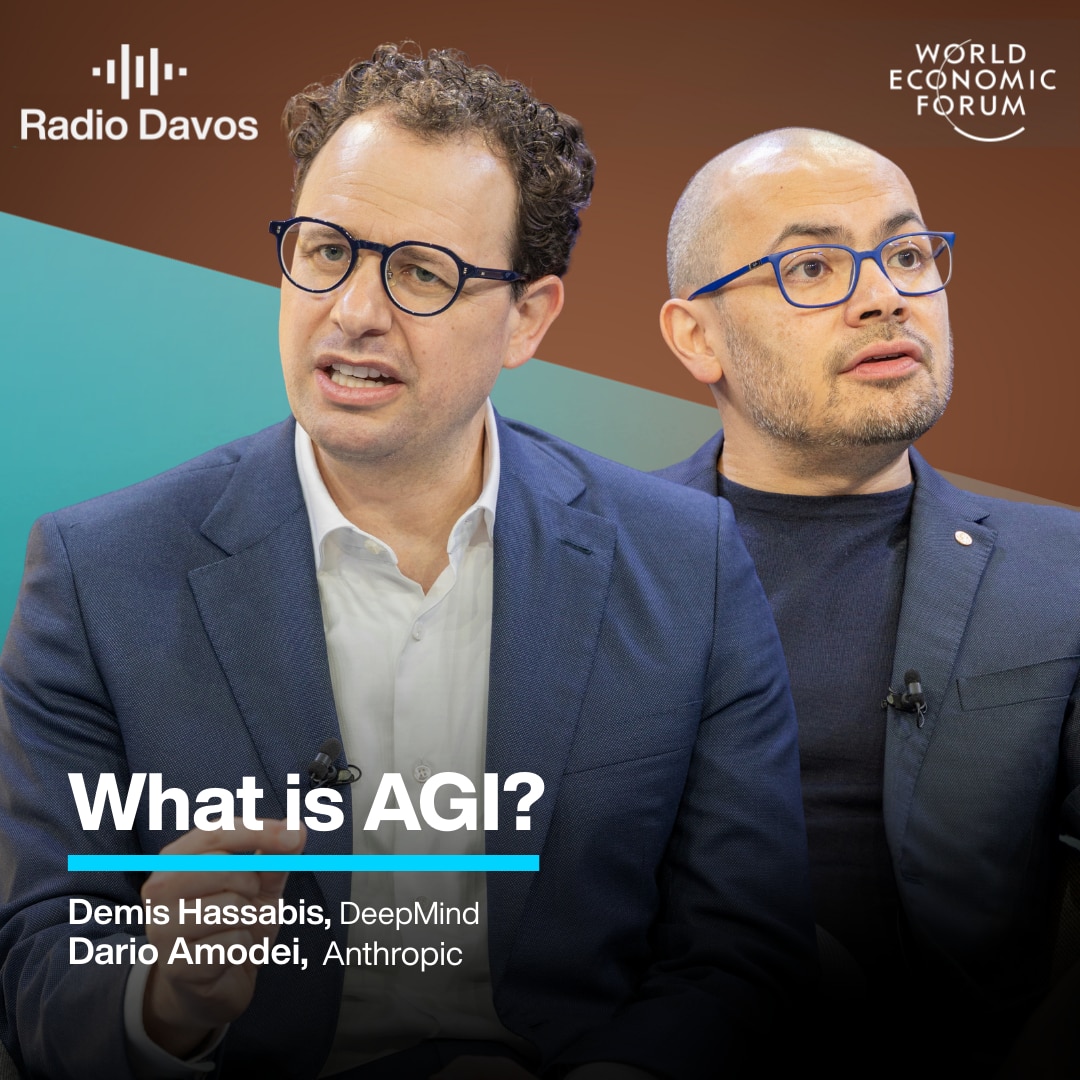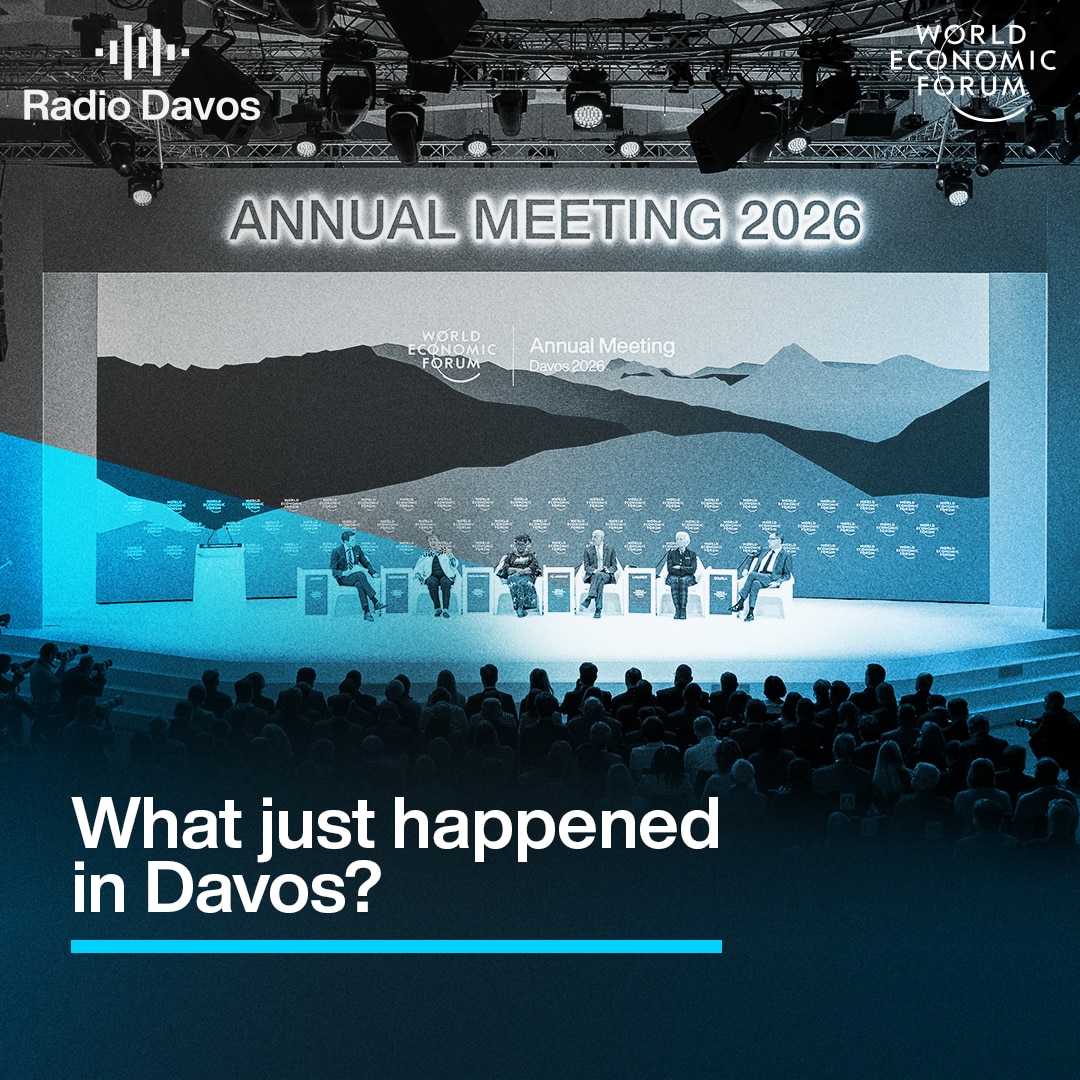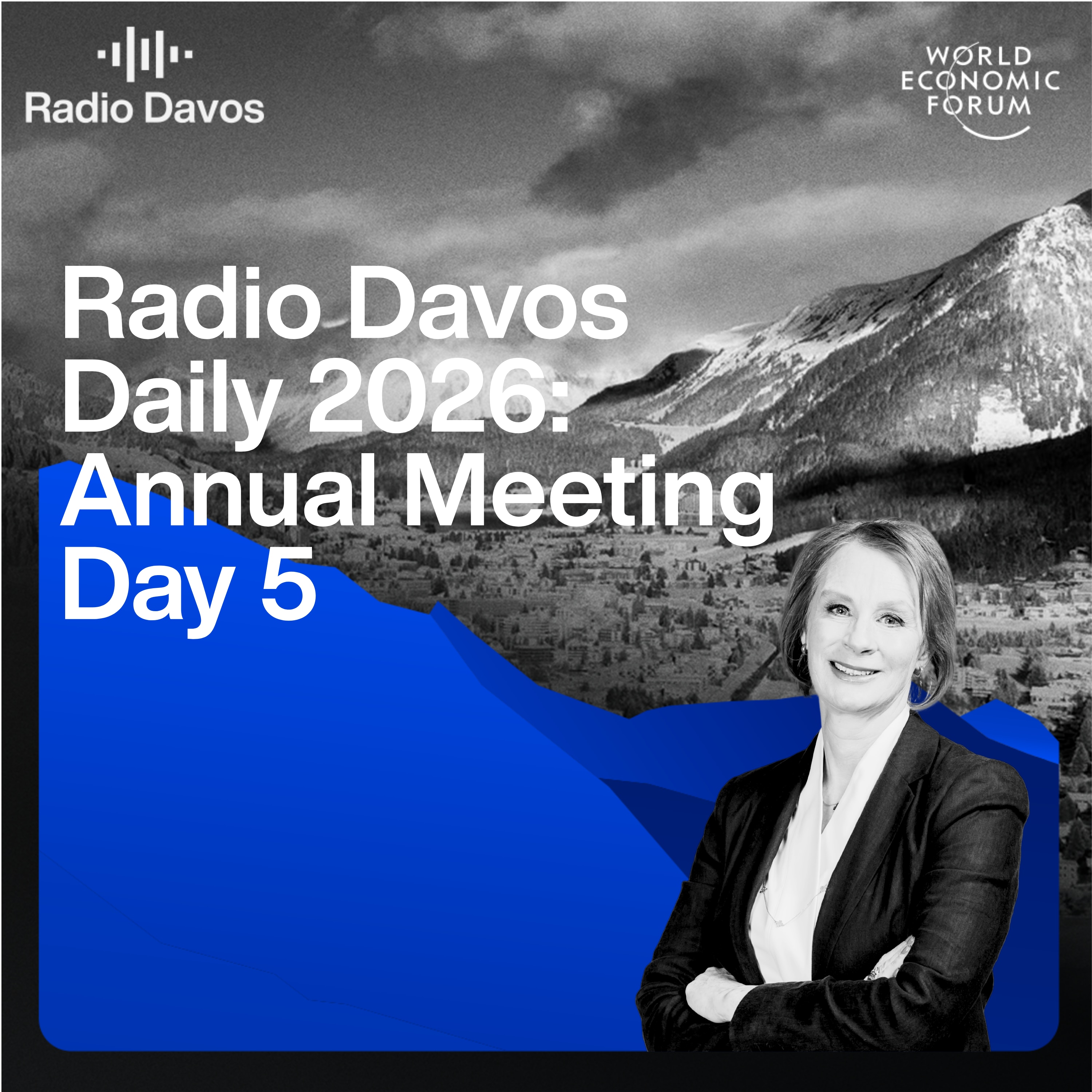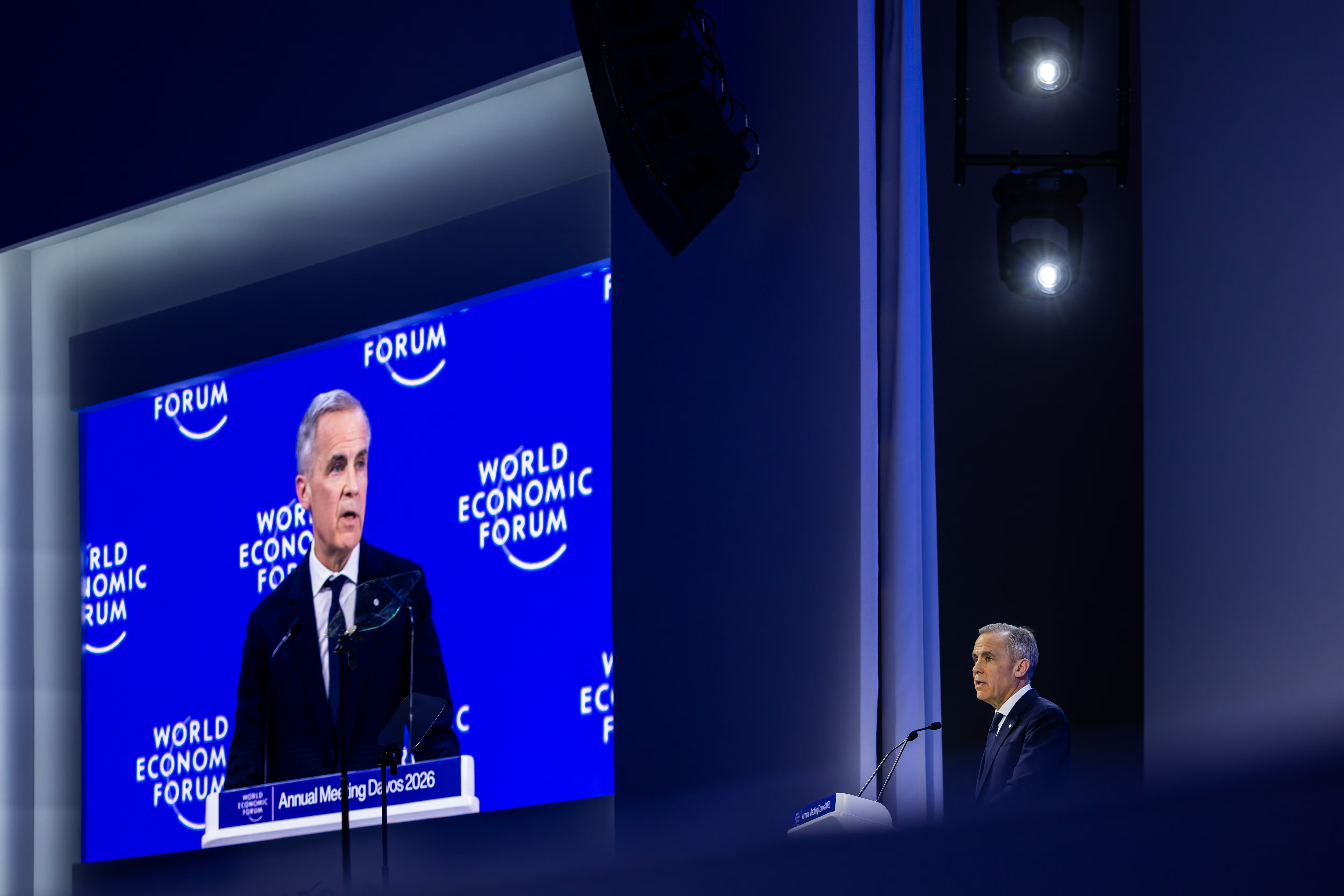Chief Economists Outlook: What's next for the global economy?
播客文字稿
This transcript has been generated using speech recognition software and may contain errors. Please check its accuracy against the audio.
Christian Keller, Head of Economic Research, Barclays: The levels of interest rates are still far away from where we were in history. But the increase came very rapidly. And this, of course, creates stress wherever that exposure to higher interest rates is very large.
Robin Pomeroy, host, Radio Davos: Welcome to Radio Davos, the podcast from the World Economic Forum that looks at the biggest challenges and how we might solve them. Today we're diving into the World Economic Forum's latest Chief Economists Outlook and exploring the state of the global economy.
Christian Keller: Could it be better? Of course. Is it actually quite optimistic for where we came from? Where I thought we would be, let's say, 6 months ago. I'm actually quite optimistic.
Robin Pomeroy: Christian Keller, Head of Economic Research at Barclays, talks us through all the big economic questions: inflation, the cost of living crisis and the fall of Silicon Valley Bank and Credit Suisse, and the stability of the banking sector.
Christian Keller: They'd been taken out of some of the tougher and more stringent regulation that were applied to the larger banks. And I think that's backfired. And I would not be surprised if from here they are being brought back into that tighter supervision, meaning, in particular, a more focus on liquidity.
Robin Pomeroy: Keller also provides insight on the resurgence of government industrial policy, the swift opening of China's economy, and the ongoing restructuring of global supply chains.
Christian Keller: You may also manage to bring back production of semiconductors into your own country, which before had been really concentrated in a few hubs in Asia and in the US, but it comes at a cost.
Robin Pomeroy: Subscribe to Radio Davos wherever you get your podcasts or visit wef.ch/podcasts where you'll also find our sister programs: Meet the Leader, Agenda Dialogues and the World Economic Forum Book Club Podcast.
I'm Robin Pomeroy at the World Economic Forum, and with this look at the Forum's Chief Economists Outlook, this is Radio Davos.
As the World Economic Forum's Growth Summit gets under way in Geneva, this episode is dedicated to the Chief Economists Outlook, a report the Forum publishes every three months or so, taking the temperature of the global economy.
My colleague, Spencer Feingold, spoke to Christian Keller, the Head of Economic Research at Barclays, and started by asking him whether he thought a global recession is on the horizon.
Christian Keller: We are far away from what I think we would call a global recession. We see growth in '23 around 2.7% or so. That's not high by historical standards for global growth, but it's still away from what you would call a recession.
Spencer Feingold: I'm curious if we could talk a bit about, you know, regional growth. People are still optimistic about growth in East Asia and the Pacific, especially with China reopening. What do you think is driving that growth in that region?
Christian Keller: I mean, China, we do know it's the reopening. It was an economy that performed very, very poorly last year. I mean, 3% growth last year for China is very low. They had a very draconian COVID policy, zero tolerance towards any outbreak. So a lot of lockdowns. Last year around this time, we had Shanghai, the economic center in a way, locked down. And that, of course, had impact on the rest of the region, actually had an impact on the world, but in particular on Asia. So with China now coming back on stream, that's a big change for the region. But there are also stories like India, you know, they're idiosyncratic stories there, stories of, you know, an economy that still has a lot a demographic growth, you know. An economy that is benefiting now, partly, one has to say, also from cheap energy out of Russia. And so it is more than China. As I said, it's India, it's Indonesia, other larger economies that are growing domestically based on domestic sources.
Spencer Feingold: And we saw recent information from the IMF that China is going to be the far biggest source of growth in the next five years, that the BRICS countries are now going to outpace the G7 countries with regards to growth. Is that going to become the new norm, you think, in the next few years, with the growth really being driven from those countries in those regions?
Christian Keller: You know, first of all, that is not new, right? I mean, the height of emerging market optimism was actually, you know, ten years back. It started before the global financial crisis. Actually, it even increased after the global financial crisis when China in 2008-09, when, you know, Europe and the US was in deep recession. China managed to really pull off a very, very strong growth base of large investment that drove commodity prices, it helped emerging markets around the world put commodity prices higher, etc..
Those were the days when there was real optimism about the BRICS, you know, Russia, Brazil, India, obviously South Africa and China.
I would say that optimism is skewed a lot. You look at Russia now, I don't think we need to say much. You know, it did better than some people expected. But, you know, it has really, really reduced its long term growth prospects.
And Brazil, you know, it's growing now of much, much lower than in the past. And we don't see it changing a lot in the near future. India is the exception. South Africa also, you know, which is a very small economy, by the way, in comparison, but it's part of the BRICS. But, you know, India doing well. But overall, it may still be true that the contribution of, you know, in particular India and China to global growth will be stronger than that of G7.
But that is not necessarily new. And if we look at it in detail, I would still think that a lot of the optimism in general is actually has faded a lot. And, you know, China now sees a strong rebound, but structurally, and I think that includes the IMF, generally economists think that China will be slowing structurally in growth over the coming over the coming years. Even demographics and given the past growth boom that they had.
Spencer Feingold: Great. And you mentioned the United States before, where do you see how do you see the economic health of the United States right now and in the rest of 2023 and the growth that'll be coming from the US?
Christian Keller: Yeah, the US is at a turning point. I mean, they they were growing quite healthily last year. There was a slowdown in the final month of last year which turned out to be a head fake. You know, the growth came back into the beginning of this year and very robust labor market. So people have jobs and wages are growing 5-6%.
So there is a lot of momentum still, but we see the signs of slowing. And that is a slowing that is desired by policymakers in particular that the Fed to tame inflation.
And so what we see now is the beginning of a shallow recession starting in the second half, in the third quarter. You know, still, as I said, shallow recession by historical standards. But it is likely, we think, that the US goes into negative growth not only from the policy tightening but also some of the banking turmoil that we saw recently probably leads to tighter credit standards, so less bank lending. And that adds up, we think, to slowing the economy into negative quote unquote growth rates.
Spencer Feingold: Well, that parlays into the next topic about inflation and the cost of living crisis. You know, we've seen in the last year or two inflation soar across the world. And consumers have definitely taken a hit on that. In our report, we found that 70% of chief economist at the cost of living crisis will remain throughout 2023. We had seen some headlines that inflation's going down earlier this year. Do you think that was false hope and we will still have an inflation problem on our hands for consumers?
Christian Keller: Well, I think we certainly saw the peak in headline inflation, at least for now. You know, year-on-year inflation rates have peaked earlier in the US, but now also in the euro area, they are coming down. There is a there are large, what we call base effects, meaning the high inflation last year. The high levels that we have will help to bring down year-on-year inflation rates from here. But, you know, certain aspects of inflation due to the non-energy inflation, non-food and non-energy inflation, the core inflation, has been quite robust and particularly in Europe.
And that has to do with, you know, strong labor markets, relatively strong wage growth and the so-called second round effects where, you know, the high input prices, energy and others have allowed company or companies were able to pass on these high input prices, these second round effects because demand is still relatively robust. And you know, I think for central banks to be comfortable that headline inflation would not only come down from where it was, but go steadily towards 2%, which is the official target, they would be concerned about making sure that this core inflation, those underlying inflation dynamics actually continue to come down. And then we may not actually we may not be fully convinced yet because rates there remain quite high. And even by end of the year, we are still in core inflation of above 3% in our forecast.
Spencer Feingold: I'm curious too about the 2% inflation goal. That's been the goal for many, many years. Do you think there's been talk of people rethinking that 2% level? What do you what do you think about that? Is 2% still a good goal for central banks around the world in our day and age?
Christian Keller: I think there's a two questions here. One is, in a way, in principle, why 2%? And a lot of people have been asking this, wasn't it just it was just coincidence? Actually the Central Bank of New Zealand in the early nineties had introduced inflation targeting, came up with it, and then everyone followed. Once you have a critical mass having as a large country, you maybe you don't want to deviate because it would mean you have a permanent inflation differential to some large country like the US or Europe. And is it the right target now? There's been a lot of debate, and some prominent economists have suggested it may be better to have three or four. Now, even if that was true. And it has to do with wanting to be away from the zero, which, you know, if you think about normally rigidities and the fact that you may want to go into negative interest rates, there is something that speaks for having a bit of a buffer. Right. And also in a world where you have a lot of structural changes and we think we are probably in an episode like this, again, if you believe that nominal rigidities, as we call it, meaning that in particular wages tend not to be cut, nominally having some inflation allows the adjustment to take in real terms. You have real wage adjustments, for example. So all this speaks maybe for having a bit more, a higher inflation target to grease the economy a bit more.
All this being said, if you start with a clean sheet, maybe you decide on 3% now rather than on two. But the question is, of course, when you make such a transition, if where you start from is not a clean sheet, you start from the reality of 2%. Having worked actually quite well. If you take the outlook from the 90 or so and in a situation where you were above two and you suddenly say our new target is three, will it actually create the same type of confidence that we had in the past, the credibility that was so useful in bringing inflation down, or when people say, well, these central bankers, they cannot get back to two so they're telling us three now and it effectively will be even higher. And you lose that credibility, you know, that stability in inflation expectations, which has been so crucial in maintaining a low and stable inflation environment. And that is a big risk. And I stop here. But I mean, this is exactly where some economist, it would say ideally maybe we would like to have three or four. Making the transition now in a situation where you're still far away from, it could actually be so detrimental. And you know that that we rather stick with it two. I'm in that camp, frankly.
Spencer Feingold: Speaking about, you know, central bank dilemmas we are seeing now. We've had high interest rates and other contractionary monetary policies for some time now trying to reel in inflation. But we're also seeing financial distress in certain sectors. So we have we see central bankers trying to balance those two things. How do you see that dilemma? Are are the high interest rates going to continue and do you see ripple effects worsening throughout various sectors?
Christian Keller: There is now a certain dilemma you call it. We could call it a certain financial dominance that has been called in the past, whereby in part, by the way through because of central bank actions in the past and as they try to save economies from deeper recession and also prevent deflation in certain areas, they kept monetary policy very expansive. And that has led to, you know, markets getting used to very low interest rates and therefore taking on risks that they otherwise probably wouldn't, meaning, you know, high debt and a lot of duration risk, meaning risk means you are very exposed to increases in interest rates. And obviously we have seen a very large increases in interest rates, very rapid increases and indeed that is more important, you know. The levels of interest rates are still, you know, not far away from where we were in history, but the increase came very rapidly. And this, of course, now creates stress wherever that duration exposure, that exposure to higher interest rates is very large, where debt is high, where people have banked on interest rates staying low for long. We've seen this now in some regional banks in the US, but we've seen it also before in some UK pension funds, etc. The triggers are different and the exact dynamics are never exactly the same, but the underlying is always that, you know, they were betting on rates or were not ready to see interest rates to go up so rapidly.
Spencer Feingold: Right. And we see I mean, we've had headlines in recent days about US and European stocks being down. We've had some very disappointing earnings from some big Wall Street figures in the first quarter. Do you think these are all ripple effects from kind of that steep, steep interest rate hikes that we've seen?
Christian Keller: Well, these are in part I mean, one has to say we saw some very good earnings results from very large US banks, from the larger ones that see actually, you know, the transition from depositors, from the weaker, smaller regional banks to them. So I think the earnings were not uniformly poor, but what we see obviously the effects from higher interest rates, not necessarily directly on those balance sheets, but what we see is the effects of of slower growth rate. I would say both, of slower growth and also, of course, higher financing costs and, you know, the need to slow the economy.
Spencer Feingold: And we kind of hinted at, you know, some of the banking disruptions that we've seen in recent months, particularly in the United States and in Switzerland, Do you think those two episodes have dampened some of the economic optimism that we felt perhaps earlier this year?
Christian Keller: Well, I think they certainly had an effect on banking sectors. I mean, I would say, by the way, just as an additional remark to your earlier question, I mean, if you look at overall performance of equity markets, it's still very, very robust. If you think from where we are now compared to the beginning of the year, you know, it's quite resilient actually. I mean, in the markets the question is much more often why are equity markets still so strong? Don't they see, you know, that a US recession is becoming more likely? So, you know, I would just say that as an additional comment to what you said about, you know, Q1 earnings, I mean, as I said, overall, still a very quite in a optimistic equity market.
Now, I think what the episode earlier in March has shown is that banks obviously are, you know, in an environment now where they can be vulnerable to the risks of being exposed to longer term interest rate exposure, duration risk. And at the same time as banks are in the business of maturity transformation, they're always exposed to a loss of confidence and the potential withdrawal of deposits. And I think, you know, we have seen that obviously in March where this was the cause ultimately for the runs on Credit Suisse, but also Silicon Valley Bank, Signature Bank and some other regional bank that have had heavy deposit losses.
Spencer Feingold: And the collapse of Silicon Valley Bank, Credit Suisse. Did those surprise you when it when when that happened?
Christian Keller: Well, I think they surprised everyone. I think that's fair to say, because otherwise it would not have been such a crisis if it had been a well announced and well anticipated event. You know, I think it's fair to say that many people probably hadn't heard of Silicon Valley Bank before and generally weren't looking at those regional banks. And Credit Suisse had been in the limelight for some time, but I don't think many had thought that the process or the deterioration that was suddenly accelerating within really days. I think that was not anticipated by anyone, really.
Spencer Feingold: A couple of statistics that also stood out to me when I was reading through the Forum's Chief Economists report, 69% of chief economist said that they thought the banking disruption, the collapse of Silicon Valley Bank, the collapse of Credit Suisse, were isolated incidents, But also 67% said that they predict further bank failures and other serious bank disruptions throughout this year. So I'm curious what you think about those two stats and kind of how you square that circle.
Christian Keller: Yeah, you know, I was confronted with those questions and I think it's in a way both. I think people realize that if you look at the exact dynamics and, you know, the various steps and exposures, for example, at Silicon Bank, they're very particular. So that's why I think, you know, it is fair to say that it's an isolated event. Now, what we also have learned, however, given that we had similar events, you know, as I said, the UK pension funds in the fall, right. The liability driven investment related as kind of a crisis. You know, that tells you that other institutions are prone to eventually, you know, face difficulties as interest rates go up and probably stay higher for some time. That's our forecast.
And, you know, you have a lot of exposure also, for example, in real estate. And you will have banks that are exposed to real estate or other institutions that are exposed to real estate. It's just one example. I don't want to pick on one sector, but everywhere where you have this exposure, you know, it's likely that there will be business models that, you know, didn't have high margins enough and relied on and continued being able to finance themselves at very, very low rates. So you should have further fallout.
And I think the difference is whether one believes that turns into a systemic crisis, i.e. something akin to 2008 and '09. And that's where we and many other economists are probably more optimistic. And that's why I think you get this kind of apparent inconsistency where people say, you know, this was idiosyncratic, but at the same time, we will see more. But overall, not seeing a necessarily a systemic crisis.
Spencer Feingold: Well, what about I mean, aside from the banking industry, do you think a lack of confidence in the banking industry or particularly disruptions will have some kind of trickle down? It'll slow down investments, particularly in sectors like, say, technology?
Christian Keller: First, I think it's a general assumption, and we think that is correct, that the episode of March will add to something that we saw already, and that is a tightening of bank lending conditions. And, you know, that was in a way to be expected. You know, we came from a situation where liquidity was extremely widely and easily available, where interest rates were very, very low. Now to a situation where interest rates have gone up decisively.
Now, interestingly, initially, that helped banks because banks pass this on in their lending activity, but not immediately on the deposits. And so that steepening of the curve for banks has helped because they made more of the assets, didn't have to pay everything, didn't have to pass everything on to depositors. That, of course, now has changed because we saw the depositors leaving. In the US, we have alternatives not only going to other banks but are going to money market funds. So that pushes interest rates that they have to pay for the depositors. So the interest margin between lending and paying on the deposit is reducing is coming down. So that hurts. And so overall, you know, the slowing economy also makes banks more reluctant to lend. So there was already a process of tightening bank lending standards.
The crisis now in March has only accelerated this. So in particular in the US, we think that the regional banks will lend less and that will have an impact on growth. So that will certainly happen. There are certain sectors which will be particularly hurt. And in general those tend to be those that had most to gain from the very low interest rate environment that we had before. And again, tech comes to mind and real estate, those who are most reliant on this very, very cheap financing and those are now sort of saying on the other side of it.
Spencer Feingold: And lastly, on this topic, we saw both in the US and in Switzerland in March, the governments step in, you know, quite forcefully to manage these crises. It got a lot of people thinking about revamping banking regulations. Do you think, do you foresee that in the coming year and kind of what's your take on how the recent banking disruptions will influence regulation on the banking sector.
Christian Keller: I think actually in Europe, the feeling is that even though it was also affected by what originally happened in the US in Silicon Valley Bank and some other regional banks and then of course, what happened in Switzerland with Credit Suisse. But if you look at it overall, European banks actually remain quite resilient. So my impression for now is that Europeans, while you know, obviously not, you know, not being ignorant to risks that continue to be there, but I think they're quite feel vindicated that the fact the way European banks were supervised and regulated actually made them relatively resilient to this situation. So I am not sure whether they are already contemplating additional regulations.
But I think what we see in the US, without going too much into the details, but you know that what happened there is that the regional banks, you know, those banks that have been coming under under pressure, they actually had been to some extent deregulated, they had been taken out of some of the tougher and more stringent regulation that were applied to the larger banks. And I think this has now backfired. And I would not be surprised if from here they are being brought back into that tighter supervision, meaning in particular, you know, a more focus on credit, on liquidity ratios which had been relaxed, etc., etc. So I think that will that will probably happen in the US, undoing some of that easing that had been done earlier in the area of of regional small and medium banks.
Spencer Feingold: Right. So just to turn the page a little bit, hoping to discuss industrial policy with you. You know for years before governments have taken kind of a light handed approach to industrial policies, but with COVID in the last few years, we've seen governments really ramp it up. You know, our report shows the vast majority of chief economists say industrial policy will be kind of the future, will be a guiding principle for global economies in the coming years. We see that with semiconductor legislations in the US, in the European Union. China, of course, has its "Made in China 2025" framework. Do you think industrial policy is officially back?
Christian Keller: Yeah, I think it is. I mean, I think that is what politicians have been saying. And, you know, it has basically been driven by what you said the pandemic and the renewed focus on resilience. And I say renewed I shouldn't be, because I think resilience in a way was really not focus for almost 20, 30 years doing globalization. I think the main focus was efficiency. And it worked. It worked very, very well for a long period. We reduced costs. We had, you know, "just in time" manufacturing, we no longer need warehouses, etc. But we also became very reliant on on certain supply chains with sometimes, you know, single places in China, for example, would being responsible for like, you know, for very important products in supply chains.
So I think it has become clear to the pandemic that one wanted to be more resilient to that. And I think the pandemic has also made countries more aware of potential geopolitical risks. And you mentioned that China for a long time has already permanently had some kind of industrial policy. And that has become clear now to Western countries that if one large player like China is having one and the rest plays in a, you know, free trade WTO system, that can lead to disadvantages. So I think there's certain reaction to that. And of course, the desire to make the transition to a, you know, a greener economy, you know, that energy green transition is also asking for a bit more state intervention, so to say. And I think you take all these together and you have a larger, larger state involved in playing a bigger role in investments in particular, and in trying to direct those investments.
Spencer Feingold: Are there anything you're concerned about kind of the return of industrial policy? You know, we saw the majority of chief economists say this could exacerbate geopolitical tensions. Already we're seeing some trade restrictions by US, other European countries on trade with high technologies with China. Do you worry about that inflaming geopolitical tensions, these policies?
Christian Keller: Certainly, I think even without the geopolitical tensions, you could argue with, you know, chicken or egg. I mean, you could say the geopolitical tensions caused this. And, you know, but what is certain is that we are coming out of a world where for, I would say, three or four decades or so really since the eighties or at least since the nineties, and then in particular accelerated since 2001 when China joined the WTO. You know, we had a trend that we roughly can describe as globalization, and that led to, you know, disinflation and, you know, less business cycles. And it led to something what we call the Great Moderation, which we had since the mid-eighties or so, you know, that we had less crises. Even if we had downturns that were less severe, inflation was more stable and, you know, companies could tap a global workforce, etc. I mean, that is in a way what we call globalization and that led to a great moderation when it comes to macro.
And if you end this, you may gain on, you know, resilience. That's true with crisis situation. You may also managed to, you know, bring back production of semiconductors to your country, which before have been really concentrated a few hubs in Asia and in the US. But it comes at a cost. And as economist, you know, we of course, also think of those costs, of the inefficiencies, the inflation, the lower growth, the higher volatility it will likely create.
And, you know, I think the geopolitical part of it is true, too, because once you have decoupled, by the way, which is a big question to how far we get to that. But then of course, you are less reliant and maybe there's a bigger tendency then to continue on that path on moving away from trade relations with other countries.
But as I said, I think just to make a quick commentary, I think it's still not clear how far we are. I mean, we certainly see a shifting of supply chains, but in particular, when it comes to China, I see many, many companies still wanting to export into China, produce in China. So I think we have to still see how far this so-called decoupling or deglobalization would really go.
Spencer Feingold: Yeah, well, that's going to be my next question. I mean, do you think deglobalization is too strong a word to use today? I mean, I know we're trending that direction, but today, are we not there yet?
Christian Keller: Yeah, I would call it. Yeah, I would say that is correct. I think, you know, if you want to use these terms, I think we are probably have seen a multi-decade long trend that what I would call globalization was all the things I described earlier.
We now are probably in a phase where this has peaked in the sense of like increasing trade every year, global trade as a share of global GDP. That already had peaked probably ten, 15 years ago. And there had been so much going on in the decades before that that was a natural peak. And now what we see, however, now is a rethinking of global value chains. Supply chains are being redesigned. And there ss a redirection of global trade flows. And it will be, as I said, it will be a globalization that no longer is necessarily just driven by cost efficiencies, but by considerations as geopolitical fault lines. You know friend sharing and in part maybe also by environmental concerns. How far do I need to ship products? Shouldn't I be near also for that reason? And you know, carbon could be become less important. A lot of global trade was actually dominated by shipping oil around. Right? If we suddenly go towards renewable energies, suddenly the focus shifts on certain minerals and methods that are needed for that and maybe less so on oil. Those are not coming necessarily from the same countries.
So in a nutshell, we will continue to see, I think, global activity, but it will be shaped by different needs and different considerations and the globalization that we've seen in the past three decades or so.
Spencer Feingold: And lastly, on supply supply chains, I mean, we've seen the war in Ukraine, we've seen COVID, we've seen new industrial policies. All of that is having an effect on supply chains. And companies are having to rethink how they move goods, how they buy goods, how they sell goods. But we're also seeing certain technologies like AI and these various technological developments that can optimize things like supply chains. Do you think those will even out? Like are you optimistic about businesses managing these kind of new economic order, this new these new supply chain fault lines?
Christian Keller: I think I'm optimistic. It's a matter of the time frame. I think there is no doubt that if you were a company that had extensive, you know, production lines and also markets to sell in Russia and Ukraine, you know, the immediate impact you're feeling now is negative. And the same with you are very involved in China and you wonder how do you possibly shift away from that. Now if you move beyond the next few years, though to a medium term I think you are very right that we now see, particularly in an AI developments that it could be boosting productivity. And productivity has been very difficult to predict. If you look at history, it often happened long after certain inventions. And, you know, and when things probably came from an invention into general purpose technologies, I think some of the things that we are watching at the moment, that we're seeing in artificial intelligence are moving in that direction, i.e., general purpose technologies. So I'm actually quite optimistic on companies being able to use those, exploit those and possibly overcoming some of the inefficiencies that are created by certain aspects of deglobalization through technology. So if you ask me, you know, currently lots of stress because we are in the transition. Medium term, I think there will be new efficiency gains through and maybe not necessarily, you know, globalization-related changes that that should help companies.
Spencer Feingold: On helping companies, our report found that most chief economists think that companies nowadays should prioritize resilience over efficiency and that diversification of suppliers is key to prospering in the new economic order. Would you advise companies about that as well?
Christian Keller: Well, these are very abstract terms. You know, I mean, you know, resilience is has become very buzzwords in a way during the pandemic. And I think look, clearly, I think we we lived in a world just before the pandemic whereby things worked so smoothly that there was and, you know, maybe companies didn't think enough how much we relied, as I said, not even on a country, but centered on certain factories, one certain factory, one certain city in China that produced something for almost the entire global market. Now, that is clearly, I think, something companies are rethinking now. Before one says, though, efficiency no longer matters. You know, I would say a company's resilience also depends on its efficiency. You know, it always has to take into consideration costs, its competitiveness in a global market. So, you know, I think resilience, yes, but I think one would never advise against efficiency. So I think we will land somewhere in the middle. And if one talks to corporates, you know, it's easy sometimes for economists to journalists to go out with certain terms and certain trends. If one talks to those who actually have to implement them on the corporate level, they often have a more differentiated view for good reasons.
Spencer Feingold: And last question, as you look towards the summer, towards the end of 2023, are you optimistic about the global economy?
Christian Keller: Overall, yes, and I would say yes, because one always has to think of the perspective. You know, I mean, yes, you know, could it be better? Of course. Is it actually quite optimistic for where we came from, where I thought we would be, let's say six months ago, where I thought it would be now. I'm actually quite optimistic. You know, some things I think about the European energy situation, you know, have turned out better than we thought. China opened earlier than we expected. The US has been more resilient so far. You know, never forget we talk a lot about the cost of living crisis. Yes. And by the way, I'm still concerned a bit about food prices. Energy is coming down, but food prices have been high. I think that continues to be a concern for me, the food situation. But in developed markets, we have almost full employment everywhere. Know low unemployment rates, the lowest in decades, a relatively robust wage growth, not fully compensating for all the inflation, but doing in part. So and probably in the coming in the coming quarters when inflation comes down, you know, actually households should be looking looking okay, particularly if unemployment remains as low as it has been.
Spencer Feingold: Great. Well, Christian, thank you so much for joining Radio Davos.
Christian Keller: Thank you. Thanks a lot.
Robin Pomeroy: Christian Keller is the Head of Economic Research at Barclays.
You can read the Chief Economists Outlook on our website weforum.org, where you can also follow the action from the Growth Summit live or on catch up.
Please subscribe to Radio Davos wherever you get your podcasts and give us a rating and a review. And join the conversation on the World Economic Forum Podcast Club on Facebook.
This episode of Radio Davos was presented by me, Robin Pomeroy, with reporting by Spencer Feingold, editing by Taz Kelleher, studio production by Gareth Nolan. We'll be back with more from the Growth Summit very soon. But for now, thanks to you for listening and goodbye.
Scroll down for full podcast transcript.
What’s going on in the global economy? Christian Keller, the Head of Economic Research at Barclays, joins Radio Davos to discuss the latest Chief Economists Outlook and explore what likely lies ahead for consumers, businesses and policymakers.
Read the Chief Economists Outlook: https://www.weforum.org/reports/chief-economists-outlook-may-2023
More on the Growth Summit: https://www.weforum.org/events/the-growth-summit-jobs-and-opportunity-for-all-2023
Check out all our podcasts on wef.ch/podcasts:
Join the World Economic Forum Podcast Club
Join the World Economic Forum Book Club
主持::
分享:
更多集:
每周 议程
每周为您呈现推动全球议程的紧要问题(英文)








